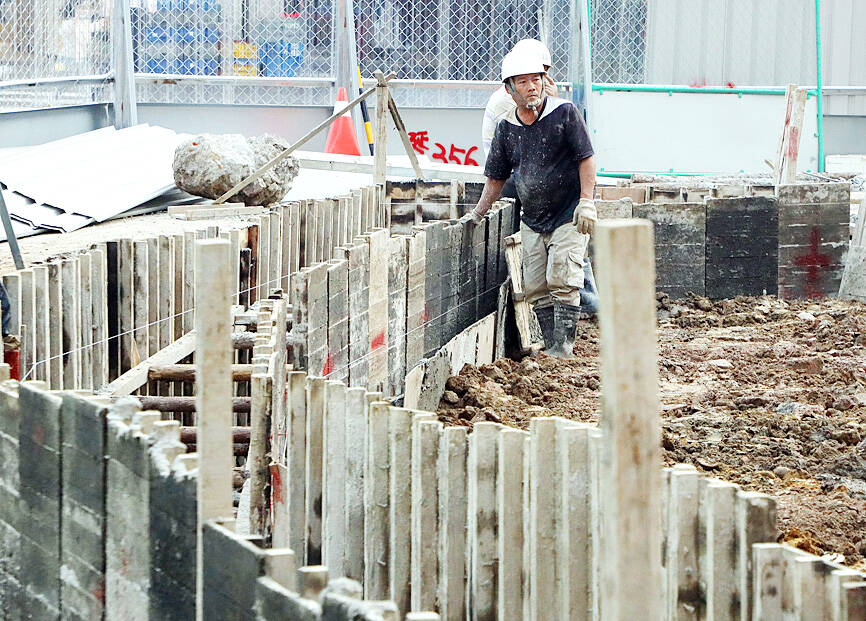Average monthly take-home pay in February increased 2.52 percent from a year earlier to NT$45,917, while total wages — which includes overtime pay, performance-based commissions and bonuses — soared 54.84 percent to NT$81,576 on the back of Lunar New Year bonuses, the Directorate-General of Budget, Accounting and Statistics (DGBAS) said yesterday.
Taiwanese firms on average issued Lunar New Year bonuses equivalent to 1.69 months of regular wages, or NT$77,348, the highest in nine years and up from 1.68 months a year earlier, Census Department Deputy Director Chen Hui-hsin (陳惠欣) said.
“The improvement came after service providers benefited from sustained revenge consumption in the post-COVID-19 pandemic era, although manufacturers took a hit from a global slowdown,” Chen told a news conference.

Photo: CNA
Financial and insurance companies offered the highest bonuses, averaging 3.64 months of wages, or NT$251,402, she said.
Manufacturers distributed 2.11 months of year-end bonuses, lower than the 2.14 months last year, she said, adding that suppliers of electronic components gave 2.76 months of bonuses, also weaker than 2.8 months a year earlier.
Exporters of tech and non-tech products had idle capacities and headcounts last year as they grappled with business declines induced by inventory adjustments and global inflation, Chen said.
Recreational facilities, hotels and restaurants fared better, issuing bonuses of 0.44 months to 0.74 months, compared with smaller bonuses or none last year, she said.
In the first two months of this year, regular take-home pay rose 2.39 percent annually to NT$46,017, while overall wages expanded 3.74 percent to NT$81,982, she said.
Real take-home wages after inflation remained in positive territory for the first time in two years with a 1.29 percent uptick as inflation pressure eased, Chen said.
The timing of the holiday also played a role, as local companies sometimes distribute year-end bonuses in December when the Lunar New Year is in January, she said.
Regular monthly wages have a fair chance of beating inflation due to the wage hikes and consumer price data, Chen said.
Holiday disruptions also explained why the number of workers hired in the industrial and service sectors in February shrank 0.25 percent, or about 21,000 people, compared with January, the DGBAS said.
Most firms halted operations for the holiday, it said.
As a result, the accession rate in February shed 0.07 percentage points to 2.04 percent, while the dropout rate gained 0.24 percentage points to 2.29 percent, it said.

STEEP DECLINE: Yesterday’s drop was the third-steepest in its history, the steepest being Monday’s drop in the wake of the tariff announcement on Wednesday last week Taiwanese stocks continued their heavy sell-off yesterday, as concerns over US tariffs and unwinding of leveraged bets weighed on the market. The benchmark TAIEX plunged 1,068.19 points, or 5.79 percent, to 17,391.76, notching the biggest drop among Asian peers as it hit a 15-month low. The decline came even after the government on late Tuesday authorized the NT$500 billion (US$15.2 billion) National Stabilization Fund (國安基金) to step in to buoy the market amid investors’ worries over tariffs imposed by US President Donald Trump. Yesterday’s decline was the third-steepest in its history, trailing only the declines of 2,065.87 points on Monday and

TAKING STOCK: A Taiwanese cookware firm in Vietnam urged customers to assess inventory or place orders early so shipments can reach the US while tariffs are paused Taiwanese businesses in Vietnam are exploring alternatives after the White House imposed a 46 percent import duty on Vietnamese goods, following US President Donald Trump’s announcement of “reciprocal” tariffs on the US’ trading partners. Lo Shih-liang (羅世良), chairman of Brico Industry Co (裕茂工業), a Taiwanese company that manufactures cast iron cookware and stove components in Vietnam, said that more than 40 percent of his business was tied to the US market, describing the constant US policy shifts as an emotional roller coaster. “I work during the day and stay up all night watching the news. I’ve been following US news until 3am

Six years ago, LVMH’s billionaire CEO Bernard Arnault and US President Donald Trump cut the blue ribbon on a factory in rural Texas that would make designer handbags for Louis Vuitton, one of the world’s best-known luxury brands. However, since the high-profile opening, the factory has faced a host of problems limiting production, 11 former Louis Vuitton employees said. The site has consistently ranked among the worst-performing for Louis Vuitton globally, “significantly” underperforming other facilities, said three former Louis Vuitton workers and a senior industry source, who cited internal rankings shared with staff. The plant’s problems — which have not

TARIFF CONCERNS: The chipmaker cited global uncertainty from US tariffs and a weakening economic outlook, but said its Singapore expansion remains on track Vanguard International Semiconductor Corp (世界先進), a foundry service provider specializing in producing power management and display driver chips, yesterday withdrew its full-year revenue projection of moderate growth for this year, as escalating US tariff tensions raised uncertainty and concern about a potential economic recession. The Hsinchu-based chipmaker in February said revenues this year would grow mildly from last year based on improving supply chain inventory levels and market demand. At the time, it also anticipated gradual quarter revenue growth. However, the US’ sweeping tariff policy has upended the industry’s supply chains and weakened economic prospects for the world economy, it said. “Now